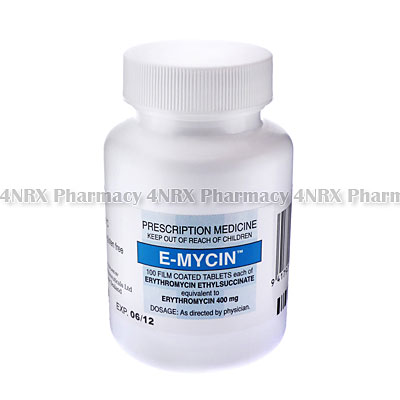 |
Home  Infection Infection  E-Mycin (Erythromycin Ethylsuccinate) E-Mycin (Erythromycin Ethylsuccinate) |
|
|||||||||
|
E-Mycin (Erythromycin Ethylsuccinate)
What is E-Mycin (Erythromycin Ethylsuccinate) used for? E-Mycin (Erythromycin Ethylsuccinate) is a type of macrolide antibiotic used to treat a wide variety of infections caused by bacteria, including Legionnaires' disease, whooping cough, venereal disease, diphtheria, bronchitis, pneumonia and infections occurring in the ear, lung, skin and many others. It may also be given before surgery or dental procedures to prevent infection, or to treat a stomach condition known as gastroparesis. How should I use E-Mycin (Erythromycin Ethylsuccinate)? E-Mycin (Erythromycin Ethylsuccinate) comes in the form of tablets, which should be swallowed whole. This medication is normally taken 4 times per day, at 6 hour intervals, or 3 times per day at 8 hour intervals. Treatment may last anything from 7 to 21 days, depending on your condition. Your physician will inform you how long treatment is required for. Continue taking this drug for the entire period of time for which it was prescribed, otherwise your infection may return. What are the side effects of E-Mycin (Erythromycin Ethylsuccinate)? Patients taking E-Mycin (Erythromycin Ethylsuccinate) may notice some side effects, such as:
Patients should be aware that this medication may also cause more serious side effects. Consult your physician immediately if you notice severe diarrhea, signs of a vaginal infection or changes in hearing. Please Note Strictly follow all instructions provided to you by your physician or pharmacist while using E-Mycin (Erythromycin Ethylsuccinate). Optimum and safe dosage can differ based on the patient and the condition being treated. As this medication may be unsafe for certain patients, it is essential you always inform your physician if you are pregnant or breastfeeding, as well as if you have any allergies, other illnesses, or ongoing health conditions, and if you are taking any other form of medication, supplements, or herbal products. Immediately seek emergency medical care if you have any allergic or hypersensitive reaction. Common signs of a reaction include hives, swelling, skin rashes, chest pains, as well as trouble breathing or swallowing. 
|
|||||||||||||||||